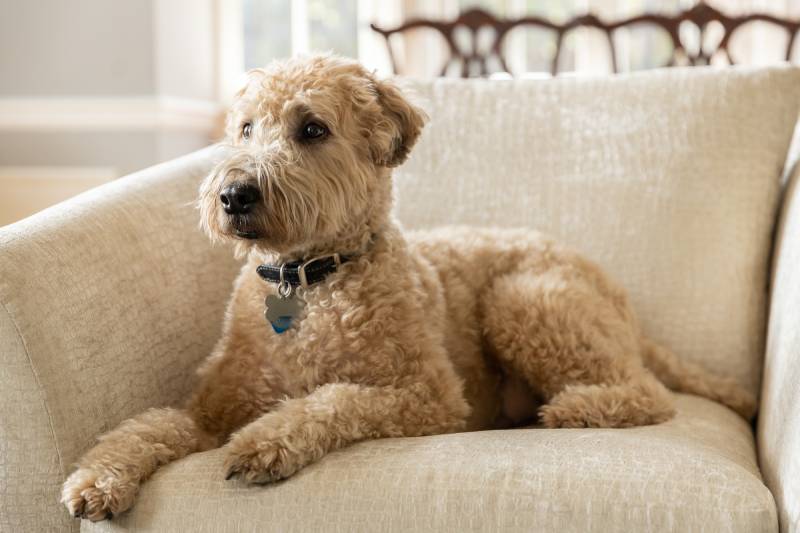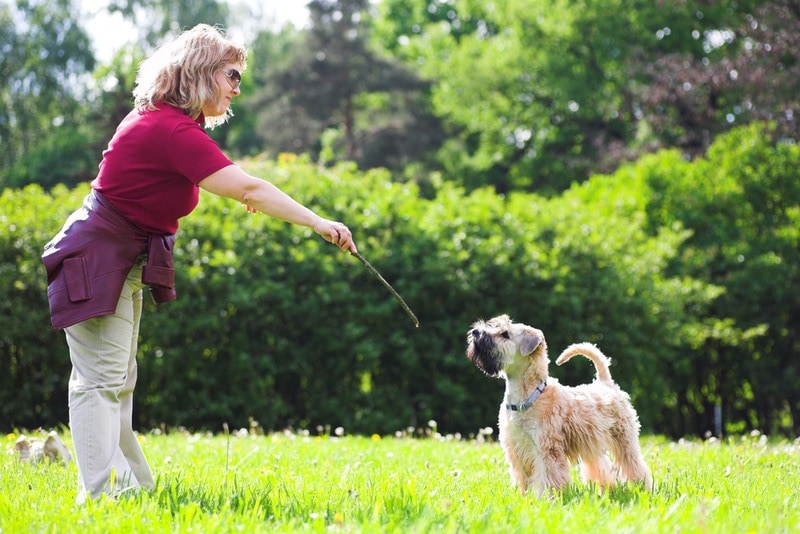
Click to Skip Ahead
Truth be told, nobody wants to deal with an aggressive dog. Not only is it extremely frustrating trying to keep their behavior in check, but it can also be dangerous for you and other people. Because of this, it’s important to get to the root cause of your Wheaten Terrier’s aggression as soon as possible, and that all starts with some fundamental knowledge.
Why is your Wheaten Terrier so aggressive in the first place, and what can you do about it? Before you give up hope, read this guide and then devise a plan to get their behavior in check once and for all.

The 6 Reasons Your Wheaten Terrier Is Showing Aggression
If your Wheaten Terrier is showing aggressive behaviors, it can be confusing and a bit scary, and the first thing you need to do to get it under control is figure out why it’s happening in the first place. We’ve highlighted six of the most common reasons your Wheaten Terrier might be showing some aggression for you below. However, keep in mind that it’s always best to reach out to a vet or behavioral specialist if it’s becoming an ongoing problem.
1. Fear/Anxiety
Dogs often act out when they feel like they don’t have any other choice, and when they feel scared or anxious, it can create a potentially dangerous situation. Over time, your Wheaten Terrier might calm down a bit and start to trust you more, but they also might need a little extra training or even medication to help them calm down. Basically, you need to figure out what the trigger for their fear or anxiety is and then remove that trigger from their environment if possible.
2. Health Problems
If your Wheaten Terrier has never shown aggressive behaviors before and they’re just now starting to behave this way, there’s a good chance there’s an underlying medical reason for the sudden change. Rage syndrome is a rare but possible occurrence for older Wheaten Terriers, and it’s more likely to affect males.
If there’s an underlying medical reason for the behavior change, it might be treatable, but the only way to find out for sure is to take them to a vet and see if they can figure out what’s going on.
3. Abuse/Neglect
There’s an old saying about how there’s no such thing as a bad dog, only bad owners. That’s essentially where the reason for their aggression lies with some dogs. It could’ve been a previous owner who neglected or abused them, but it can be extremely challenging to overcome this behavior once it’s started. You’ll need to develop a plan and likely seek professional help to have a chance if you suspect that your dog is aggressive from previous abuse or neglect.

4. Territorial
Some dogs are simply more territorial than others, and while this usually isn’t a problem for Wheaten Terriers, it can be. If this is the reason for your pup’s aggression, they shouldn’t act this way when they’re not in” their area.” Of course, it doesn’t excuse the behavior, but it does give you a starting point for remedying it.
5. Resource Guarding
Dogs that feel like they won’t get enough food and water are likely to become highly aggressive because of it. You can help remedy this issue by ensuring they get access to plenty of food and water, but even then, this might not be enough without some behavioral training too.
6. Protective Behavior
Some dogs simply have strong protective tendencies, and they want to look after their pack. Often, these pups will look to protect members of the family they don’t view as alphas, often children and women. They could also feel the need to protect other pets in the family, and these behaviors are more likely to present themselves when they perceive an outside threat.


How to Treat Dog Aggression
If your Wheaten Terrier is showing some aggressive tendencies, only one thing is certain: you need to do something about it. It’s not always an easy path forward, but once you know what to do, you can start to take the necessary steps to get it under control.
Talk to a Vet
The first thing you’ll want to rule out if your Wheaten Terrier is acting aggressively is an underlying medical issue. Not only does taking them to a vet help you rule this out, but it also lets you talk to an expert about what you’re going through. It’s a win-win, which is why it’s the very first step you should take.
Get Professional Help
Often, a vet will help point you in the direction of a behavioral specialist, but if they don’t, you’ll want to take the time to find a great one on your own. They can help you figure out why your Wheaten Terrier is acting the way they are and help you get it under control before it starts to escalate.

Create a Plan
Once you and a professional figure out why your Wheaten Terrier is acting so aggressively, it’s time to devise a plan to remedy the behavior. It will likely take some time, but once you have a plan in place, it’s easier to measure success and come up with something that will work for both you and your Wheaten Terrier.
Stay Positive
It’s easy to get frustrated when things aren’t going your way with an aggressive Wheaten Terrier, but it’s important to stay positive when training them. Not only that, but it’s important to stick with positive reinforcement and avoid negative repercussions, as these can actually lead to an even more aggressive dog.

Final Thoughts
We know that dealing with an aggressive Wheaten Terrier can be both frustrating and dangerous, and now that you know what some of the root causes are and what you can do about it, all that’s left is for you to take the necessary steps to get it under control.
Don’t be too prideful and avoid seeking out professional help because the sooner you enlist their expertise, the more likely you can get their behaviors under control before they escalate.
Featured Image Credit: bohemama, Shutterstock






